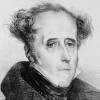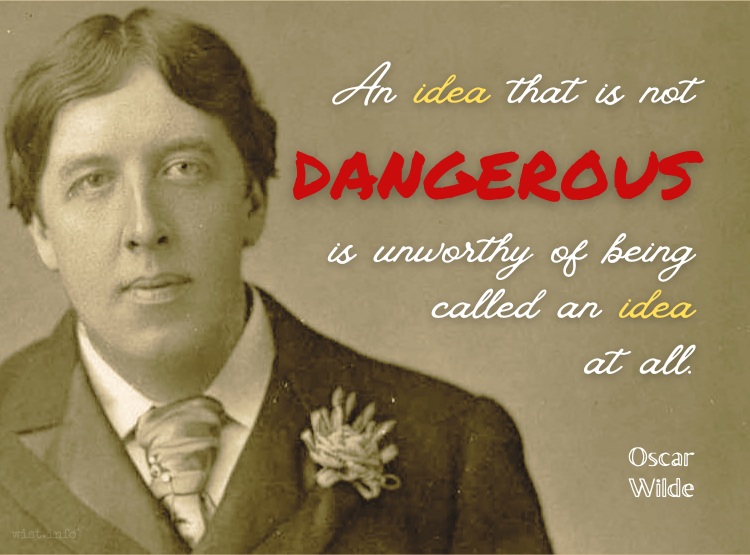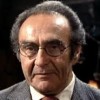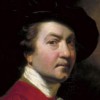As soon as a true thought has entered our mind, it gives a light which makes us see a crowd of other objects which we have never perceived before.
[Aussitôt qu’une pensée vraie est entrée dans notre esprit, elle jette une lumière qui nous fait voir une foule d’autres objets que nous n’apercevions pas auparavant.]
François-René de Chateaubriand (1768-1848) French writer, politican, diplomat
“Pensées, Réflexions et Maximes,” Complete Works of Chateaubriand [Oeuvres Illustrées de Chateaubriand], Vol. 3, sec. 7 (1852)
(Source)
Quotations about:
thought
Note not all quotations have been tagged, so Search may find additional quotes on this topic.
A person who does not read cannot think. He may have good mental processes, but he has nothing to think about. You can feel for people or natural phenomena and react to them, but they are not ideas. You cannot think about them.
If nature has made any one thing less susceptible, than all others, of exclusive property, it is the action of the thinking power called an Idea; which an individual may exclusively possess as long as he keeps it to himself; but the moment it is divulged, it forces itself into the possession of every one, and the reciever cannot dispossess himself of it. it’s peculiar character too is that no one possesses the less, because every other possesses the whole of it. He who recieves an idea from me, recieves instruction himself, without lessening mine; as he who lights his taper at mine, recieves light without darkening me.
Thomas Jefferson (1743-1826) American political philosopher, polymath, statesman, US President (1801-09)
Letter to Isaac McPherson (13 Aug 1813)
(Source)
All you learn and all you can read will be of little use to you if you do not think and reason upon it yourself. One reads to know other people’s thoughts, but if we take them upon trust, without examining and comparing them with our own, it is really living upon other people’s scraps or retailing other people’s goods. To know the thoughts of others, is of use, because it suggests thoughts to one’s self, and helps one
to form a judgment; but to repeat other people’s thoughts, without considering whether they are right or wrong, is the talent only of a parrot, or at most a player.Lord Chesterfield (1694-1773) English statesman, wit [Philip Dormer Stanhope]
Letter to his son, #67, “Thursday” (1740-41)
(Source)
An idea that is not dangerous is unworthy of being called an idea at all.
Oscar Wilde (1854-1900) Irish poet, wit, dramatist
“The Critic as Artist,” Part 2 [Gilbert], Intentions (1891)
(Source)
Orthodoxy:
- In religion, that state of mind which congratulates itself on being absolutely right, and a belief that all who think otherwise are wholly wrong.
- A faith in the fixed — a worship of the static.
- The joy that comes from thinking that most everybody is lined up for Limbus with no return ticket.
- A condition brought about by the sprites of Humor, according to the rule that whom the gods would destroy they first make mad.
- The zenith of selfishness and the nadir of egotism.
- Mephisto with a lily in his hand.
- A corpse that does not know it is dead.
- Spiritual constipation.
- That peculiar condition where the patient can neither eliminate an old idea or absorb a new one.
Elbert Hubbard (1856-1915) American writer, businessman, philosopher
The Roycroft Dictionary (1914)
(Source)
The question is: Bad as I am, have I the right to think? And I think I have for two reasons: First, I cannot help it. And secondly, I like it.
Robert Green Ingersoll (1833-1899) American lawyer, agnostic, orator
“What Must We Do To Be Saved?” Sec. 1 (1880)
(Source)
The world can only be grasped by action, not by contemplation. The hand is more important than the eye. We are active; and indeed we know, as something more than a symbolic accident in the evolution of man, that it is the hand that drives the subsequent evolution of the brain. We find tools today made by man before he became man. Benjamin Franklin in 1778 called man “a tool-making animal,” and that is right.
Unreason and anti-intellectualism abominate thought. Thinking implies disagreement; and disagreement implies nonconformity; and nonconformity implies heresy; and heresy implies disloyalty — so, obviously, thinking must be stopped. But shouting is not a substitute for thinking and reason is not the subversion but the salvation of freedom.
Adlai Stevenson (1900-1965) American diplomat, statesman
Call to Greatness, ch. 3 “America’s Burden” (1954)
(Source)
Adapted from his "A Troubled World," Godkin Lectures, Harvard University (1954-03-17 - 1954-03-20)
HAMLET: Thus conscience does make cowards of us all,
And thus the native hue of resolution
Is sicklied o’er with the pale cast of thought,
And enterprises of great pitch and moment
With this regard their currents turn awry
And lose the name of action.William Shakespeare (1564-1616) English dramatist and poet
Hamlet, Act 3, sc. 1, l. 91ff (3.1.91-96) (c. 1600)
(Source)
"Conscience" in this case is used in its archaic form, as consciousness, awareness.
The first of the four cardinal virtues of the Roman Catholic Church is “prudentia,” which basically means damn good thinking. Christ came to take away our sins, not our minds.
William Sloane Coffin, Jr. (1924-2006) American minister, social activist
Credo, “Faith, Hope, Love” (2004)
(Source)
The man who does not do his own thinking is a slave, and is a traitor to himself and to his fellow-men.
Robert Green Ingersoll (1833-1899) American lawyer, agnostic, orator
“The Liberty of Man, Woman, and Child” (1877)
(Source)
Why should man be afraid to think, and why should he fear to express his thoughts? Is it possible that an infinite Deity is unwilling that a man should investigate the phenomena by which he is surrounded? Is it possible that a god delights in threatening and terrifying men? What glory, what honor and renown a god must win on such a field! The ocean raving at a drop; a star envious of a candle; the sun jealous of a fire-fly.
Robert Green Ingersoll (1833-1899) American lawyer, agnostic, orator
“Heretics and Heresies” (1874)
(Source)
Men of genius are often dull and inert in society, as a blazing meteor, when it descends to earth, is only a stone.
There are thoughts which are prayers. There are moments when, whatever the posture of the body, the soul is on its knees.
[De certaines pensées sont des prières. Il y a des moments où, quelle que soit l’attitude du corps, l’âme est à genoux.]
Victor Hugo (1802-1885) French writer
Les Misérables, Part 4 “Saint Denis,” Book 5 “The End of Which Does Not Resemble the Beginning,” ch. 4 (4.5.4) (1862) [tr. Denny (1976)]
(Source)
(Source (French)). Alternate translations:
Certain thoughts are prayers. There are moments when, whatever be the attitude of the body, the soul is on its knees.
[tr. Wilbour (1862)]
Certain thoughts are prayers. There are moments when the soul is kneeling, no matter what the attitude of the body may be.
[tr. Wraxall (1862)]
Certain thoughts are prayers. There are moments when, whatever the attitude of the body may be, the soul is on its knees.
[tr. Hapgood (1887)]
Certain thoughts are prayers. There are moments when, whatever the attitude of the body, the soul is on its knees.
[tr. Wilbour/Fahnestock/MacAfee (1987)]
Thought is the labor of the intellect, reverie is its pleasure.
[La pensée est le labeur de l’intelligence, la rêverie en est la volupté.]
The limits of my language mark the limits of my world.
Ludwig Wittgenstein (1889-1951) Austrian-English philosopher
Tractatus Logico-Philosophicus, 5.6 (1921)
Alt. trans:
- "The boundary of my language is the boundary of my world." [tr. Kolak]
- "The limits of my language mean the limits of my world." [tr. Pears and McGuinness]
- "The limits of my language stand for the limits of my world."
It saddens me that literacy has become suspect, and degraded, given how many millions of years of evolution spent developing the ability to create language. The quality of our thoughts is bordered on all sides by our facility with language. The less precise the usage, the less clear the process of language, the less you can achieve what you want to achieve when you open you mouth to say something. We have slowly bastardized and degraded and weakened the language, abetted and abided by a growing cultural disdain for literacy, a cyclical trend toward anti-intellectualism.
J. Michael (Joe) Straczynski (b. 1954) American screenwriter, producer, author [a/k/a "JMS"]
rec.arts.sf.tv.babylon5.moderated, “ATTN JMS: Influences?” (27 Oct 1995)
(Source)
In the practice of art, as well as in morals, it is necessary to keep a watchful and jealous eye over ourselves; idleness, assuming the specious disguise of industry, will lull to sleep all suspicion of our want of an active exertion of strength. A provision of endless apparatus, a bustle of infinite enquiry and research, or even the mere mechanical labour of copying, may be employed, to evade and shuffle off real labour, — the real labour of thinking.
Joshua Reynolds (1723-1792) British painter, critic
Speech to the Royal Academy, London (10 Dec 1784)
(Source)
Paraphrased over a long period of time (and still attributed to Reynolds) as: "There is no expedient to which a man will not resort to avoid the real labor of thinking."
The lecture was later described as the Twelfth Discourse in a 1797 collection of Reynolds' works.
Often attributed to Thomas Edison. More information here.
For it is not enough to have a good mind; the main thing is to apply it well. The greatest souls are capable of the greatest vices as well as the greatest virtues; and those who proceed but very slowly can make much greater progress, if they always follow the right path, than those who hurry and stray from it.
[Car ce n’est pas assez d’avoir l’esprit bon, mais le principal est de l’appliquer bien. Les plus grandes âmes sont capables des plus grands vices aussi bien que des plus grandes vertus; et ceux qui ne marchent que fort lentement peuvent avancer beaucoup davantage, s’ils suivent toujours le droit chemin, que ne font ceux qui courent et qui s’en éloignent.]
René Descartes (1596-1650) French philosopher, mathematician
Discourse on Method [Discours de la méthode], Part 1 (1637) [tr. Cottingham, Stoothoff (1985)]
(Source)
Sometimes quoted "the main thing is to use it well." (Source (French)). Alternate translations:
For ’tis not enough to have good faculties, but the principal is, to apply them well. The greatest Souls are as capable of the greatest Vices, as of the most eminent Vertues: And those who move but very slowly, may advance much farther, if they always follow the right way; then those who run and straggle from it.
[tr. Newcombe ed. (1649)]
For to be possessed of a vigorous mind is not enough; the prime requisite is rightly to apply it. The greatest minds, as they are capable of the highest excellences, are open likewise to the greatest aberrations; and those who travel very slowly may yet make far greater progress, provided they keep always to the straight road, than those who, while they run, forsake it.
[tr. Veitch (1901)
For to be possessed of good mental powers is not sufficient; the principal matter is to apply them well. The greatest minds are capable of the greatest vices as well as of the greatest virtues, and those who proceed very slowly may, provided they always follow the straight road, really advance much faster than those who, though they run, forsake it.
[tr. Haldane, Ross (1911)]






















